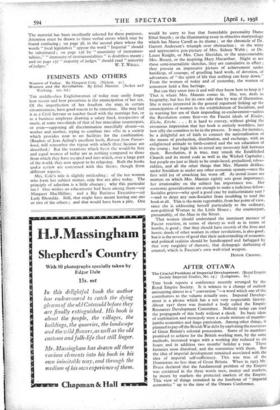FEMINISTS AND OTHERS
Women of Today. By Margaret Cole. (Nelson. 5s.)
THE middle-class Englishwoman of today may easily forget how recent and how precarious is the emancipation of her sex. Of the imperfection of her freedom she may, in certain circumstances, have good reason to be conscious. She may feel it as a Civil Servant or teacher faced with the marriage bar, or as a business employee drawing a salary fixed, irrespective of merit, at some two-thirds of that of her masculine counterpart, or even—supposing all discrimination mercifully absent—as worker and mother, trying to combine two roles in a society which provides next to no facilities for the combination. (Readers of Jean Ayling's excellent book, Retreat from Parent- hood, will remember the vigour with which these lacunae are described.) But the vexations which beset the would-be free and equal women of today are as nothing compared to those from which they have escaped and into which, over a large part of the world, they now appear to be relapsing. Both the books under review are concerned with this them; though from different aspects.
Mrs. Cole's title is slightly misleading ; of the ten women who form her subject matter, only five are alive today. The principle of selection is a little obscure ; why this particular ten ? One wishes an educationist had been among them—say Margaret MacMillan; and a Big Business Executive—say Lady Rhondda. Still, that might have meant leaving out one or two of the others; and that would have been a pity. One would be sorry to lose that formidable personality Dame Ethel Smyth ; or the illuminating essay in objective martyrology which has Nurse Cavell as its theme ; or the chronicle of Dr. Garrett Anderson's triumph over obstruction ; or the witty and appreciative pen-picture of Mrs. Sidney Webb ; or Dr. Laura Knight, or Mrs. Clare Sheridan, or the unaccountable Mrs. Besant, or the inspiring Mary Macarthur. Slight as are these semi-journalistic sketches, they are cumulative in effect ; they present an impressive picture of achievement under handicap, of courage, of gruelling hard work, of devotion, of adventure, of " the spirit of life that nothing can keep down." From the women of today and of yesterday, the women of tomorrow hold a fine heritage.
But can they enter into it and will they know how to keep it ? That is where Mrs. Mannin comes in. She, too, deals in biography, but less for its own sake than by way of illustration. She is more interested in the general argument linking up the emancipation' of women to the establishment of Socialism, and in warning her sex of their impending re-enslavement—unless the Revolution comes first—to the Fascist ideals of Kinder, Kiiche, Kirche. . . . It is hard to convey, without giving the erroneous impression that her book is entirely worthless, just how silly she contrives to be in the process. It may, for instance, be a delightful act of faith to connect the nationalisation of the means of production, distribution, and exchange, with an enlightened attitude to birth-control and the sex education of the young ; but logic fails to reveal any necessary link between them. Revolution, it is true, may smash the Established Church and its moral code as well as the Wicked Capitalist ; but people are just as likely to be strait-laced, prejudiced, taboo- ridden, and all the other things that Mrs Mannin dislikes, under Socialism as under any other economic system—once the first wild joy of smashing has worn off. As moral issues are matters on which Mrs. Mannin rightly sets great importance, her irrationality on the subject has importance too. Her economic generalisations are enough to make a judicious fellow- Socialist grieve—why spoil a good case by indiscriminate rant ? —and to deter any non-Socialist from troubling to read the book at all. This is the more regrettable, from her point of view, since she is addressing herself particularly to the ordinary, non-political Woman in the Little House ; the counterpart, presumably, of the Man in the Street.
That women should understand the imminent menace of Fascist reaction, in terms of slavery as well as in terms of bombs, is good ; that they should have records of the lives and heroic deeds of other women in other revolutions, is also good; but it is the reverse of good that their understanding of economic and political realities should be handicapped and befogged by that very turgidity of rhetoric, that demagogic darkening of counsel, which is Fascism's own well-tried weapon.
HONOR CROOME.














































 Previous page
Previous page